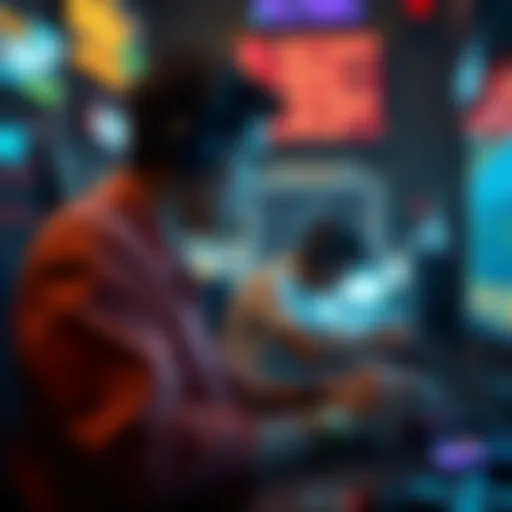Exploring the Multifaceted Landscape of Reality Shows


Intro
Reality television has wormed its way into the very fabric of our daily lives. No longer just a guilty pleasure, these shows have evolved into a mirror reflecting societal norms, human behavior, and aspirations. They present an intriguing blend of entertainment and genuine emotion, often blurring the lines between reality and performance. From competitive cooking shows to the trials and tribulations of everyday lives, this genre is varied and multifaceted.
In the contemporary media landscape, reality shows hold a compelling space. They captivate viewers with their unfiltered glimpses into human experiences. A good number of people resonate with the drama and the journey of various participants, making this genre not only a source of entertainment but also a discussion starter. Let’s peel back the layers and delve deeper into what reality shows bring forth in our culture—tracing their history, understanding their appeal, and considering their impact on society.
Prelims to Reality Shows
Reality television has carved out a unique niche in the entertainment landscape, drawing viewers with its mixture of genuine emotion, unpredictable outcomes, and relatable situation. This genre does not only entertain; it mirrors society, showcasing human experiences and interactions under scrutiny. In a world increasingly influenced by digital media, understanding reality shows can provide insight into broader social dynamics and audience behaviors.
Defining Reality Television
Reality television, at its core, is a genre that focuses on documenting real-life situations, often featuring ordinary people rather than trained actors. The defining element of reality TV involves its focus on authenticity—albeit a curated version of it. The boundaries of this authenticity can sometimes blur, raising questions about what is real in a world that thrives on sensationalism.
One hallmark of reality shows is their ability to attract diverse audiences with various interests. Programs like Survivor, Big Brother, and The Real World have taken viewers from the comfort of their living rooms into extreme and often competitive settings, presenting challenges that test human spirit and resilience. The viewer's emotional investment in these characters becomes a key driver of the show's success.
Moreover, reality television thrives on storytelling that resonates with the audience. The ability to relate to characters' experiences, whether they involve love, friendship, or rivalry, enhances engagement, inviting viewers to see their reflections in the lives on screen.
The Evolution of Reality Shows
The evolution of reality television has been nothing short of a phenomenon. It dates back to earlier television formats, where unscripted programming started gaining traction. Shows like An American Family in the early 1970s gave audiences a glimpse into a family's daily life, planting the seeds for future formats. However, it wasn't until the early 2000s, with the explosion of competitive reality shows, that the genre skyrocketed in popularity.
Programs like American Idol opened the floodgates for talent-based shows, where ordinary individuals strove to achieve stardom. This era marked a significant shift where audiences began to appreciate the complexity of reality television narratives. The advent of social media further transformed this genre by allowing fans to engage with contestants and each other, creating a more immersive experience.
Today, one can find an array of subgenres encompassing everything from survival competitions to social experiments. The adaptability of reality shows is a testament to their ingrained status in contemporary media. As they evolve, they continue to hold a mirror to society, reflecting cultural shifts, societal issues, and the ever-changing landscape of viewer expectations.
"Reality TV is like a modern-day soap opera, but the drama is often ripped straight from the headlines, revealing the complexities of life as we know it."
In summation, the introduction of reality shows cultivates a realm where viewers are not just spectators but participants in a broader narrative. Understanding the genre's definitions and its historical progression sheds light on its societal significance and cultural relevance.
Historical Context
Understanding the historical context of reality television is crucial for grasping its impact on today’s media landscape. Reality TV didn’t emerge from a vacuum; it reflects broader societal changes and technological advancements through the years. This genre of TV not only entertains but also serves as a mirror to the evolution of social norms, values, and expectations. By looking at its roots, we can better comprehend how it has shaped our viewing habits and cultural dialogues.
Early Influences in Reality Television
The seeds of reality television can be traced back to a variety of influences long before the term ‘reality TV’ became fashionable. One could argue that early documentaries, such as the groundbreaking series An American Family in the early 1970s, set a precedent by showcasing the real-life dynamics of an American family. This program presented domestic life authentically, capturing both the mundane and the extraordinary.
- Documentary Roots: Documentaries laid the groundwork by presenting unfiltered narratives, unlike scripted shows that relied on fabricated plots and characters.
- Candid Camera: This long-running show introduced viewers to the concept of observing real people in genuine situations, paving the way for more staged and dramatized scenarios in modern reality shows.
Reality TV, as we know it, began to crystallize in the late 1990s and early 2000s, with shows like Survivor and Big Brother. These programs garnered widespread attention and changed the way networks viewed audience expectations, showcasing not just competition but also human interaction in highly controlled environments.
Key Milestones in Reality TV Development
The journey of reality television is marked by several pivotal milestones that transformed it from niche programming to a dominant force in entertainment.
- The Rise of the Reality Phenomenon: The concept exploded in mainstream media post-2000, with shows capturing different facets of life—from dating to survival to talent.
- Emergence of Reality Competition Shows: Programs like The Amazing Race and American Idol not only highlighted competition but also created a participating audience through voting and social interaction, engaging fans at multiple levels.
- Cultural Integration: As reality TV became a staple, it mirrored societal trends, discussing everything from body image issues in The Biggest Loser to social inequality in The Real World. This reflection brought the audience face-to-face with pressing social issues often glossed over in script-based narratives.
- Digital Platforms and Changes in Consumption: The advent of digital platforms allowed viewers to binge-watch and engage with content at their own pace. This evolution has shifted how producers create and promote content, making them more responsive to audience feedback.
"Reality TV brings the audience into the narrative like never before, paralleling their experiences with those on screen."
Each milestone, whether it be an iconic series or a technological leap, contributes to the broader story of how reality television shapes and reflects our culture. Understanding these developments not only enriches our appreciation of reality shows but also informs discussions about their future evolution and relevance in a constantly changing media environment.
Genres of Reality Television


The genre of reality television plays a pivotal role in defining the medium and shaping audience expectations. Understanding the various genres within this realm not only enhances our appreciation of the content but also illuminates the significant ways in which these shows resonate with viewers’ lives. From competition shows that inspire participants to chase their dreams to lifestyle programming that taps into personal transformations, each genre offers unique spectacles that reflect broader societal themes, concerns, and aspirations.
Competition-Based Reality Shows
Competition-based reality shows, such as Survivor or The Amazing Race, bring a touch of adrenaline to the viewer’s screen. These formats often set the stage for contestants to vie for a substantial reward, whether it's cash, a coveted position in a career, or a once-in-a-lifetime experience. The narratives unfold not just through the challenges faced but also through the interpersonal dramas that emerge among participants.
These shows captivate audiences with a mix of strategy and emotional investment, inviting viewers to root for their favorite competitors while also engaging with the ethical complexities of competition itself. Participants often face dilemmas that challenge their morals, raising questions about how far one might go for success. Here, the genre reflects society’s ongoing conversation around ambition and the lengths individuals will traverse to attain their dreams.
Lifestyle and Makeover Shows
Lifestyle and makeover shows, such as Queer Eye or The Biggest Loser, have a unique ability to connect with viewers on a personal level. They often highlight transformative journeys, showcasing not just physical changes, but emotional and mental growth as well. In an age where self-improvement is highly valued, these shows provide tangible ideas and inspiration for viewers seeking to make positive changes in their own lives.
The format typically features experts guiding participants through various aspects of their lives—fashion, health, home organization—and the connection that forms between them adds an emotional depth. Ultimately, these shows serve a beneficial purpose, delivering a feel-good narrative that encourages viewers to strive for self-betterment, while also reinforcing community values and support.
Docuseries and Social Experiment Formats
Docuseries such as Making a Murderer or social experiment shows like Big Brother offer a different lens through which to explore human behavior and social dynamics. These genres blend storytelling with real-life scenarios, often exposing truths about society and human nature. They prompt viewers to reflect on issues such as justice, morality, and the nature of reality itself.
In the realm of docuseries, audiences are invited to tune into the lives of others, experiencing events and shortcomings that resonate with larger societal questions. Meanwhile, social experiments blur the line between entertainment and reality, illustrating how individuals react to controlled circumstances—this can be anything from living in close quarters to facing moral dilemmas. This genre's captivating premise ignites discussions about ethics, privacy, and personal choice.
Docusoaps and Their Appeal
Docusoaps like Keeping Up with the Kardashians or The Real World blend documentary-style storytelling with soap-opera-like intrigue. These shows provide viewers with an inside look into the lives of their favorite personalities, often focusing on mundane moments alongside dramatic revelations. The allure lies in the relatability of the content; viewers might see parts of their lives mirrored on screen, causing them to feel a connection to the individuals portrayed.
This genre effectively combines entertainment with voyeurism, allowing audiences to experience the highs and lows of others' lives while providing escapism. Moreover, docusoaps often leave viewers anxiously awaiting the next episode, intrigued by the unfolding storylines which are both relatable and sensationalized. They pave the way for discussions about fame, personal branding, and the reality of reality itself.
Popularity of reality shows often stems from their dual nature of inspiring and entertaining, leaving us with food for thought on matters beyond the screen.
Cultural Impacts
The realm of reality television extends beyond mere entertainment; it acts as a mirror reflecting societal trends, values, and challenges. The significance of cultural impacts in this context cannot be overstated, as reality shows often engage with pressing social issues and norms. They furnish both a platform for discourse and a means of self-exploration for audiences. By examining the interplay between reality television and cultural narratives, one can glean insights about the wider social tapestry that influences contemporary thought and behavior.
Reflections of Social Norms and Issues
Reality shows often take a hard look at what makes society tick. From The Real World to Keeping Up with the Kardashians, these programs showcase a variety of lifestyles, beliefs, and customs. What stands out is their ability to present real dilemmas and triumphs that resonate with viewers.
The inclusion of marginalized voices in shows like Queer Eye breaks barriers, prompting discussions about acceptance and diversity. This visibility can catalyze change in societal attitudes towards issues such as race, gender, and sexual orientation. Viewers not only consume content but are also influenced to reflect on their beliefs, prompting personal transformations and shifts in perspectives.
Moreover, reality television doesn’t shy away from darker societal realities, such as poverty and mental health. Shows like Intervention tackle addiction head-on, sparking conversations that were once deemed taboo. As these issues enter public consciousness, observers notice a correlation with societal shifts.
“Television is a strong ethos of modern culture; it reflects what we care about, worry about, and celebrate.”
Influence on Viewers’ Perceptions and Behavior
The impact of reality television on viewer behavior can be subtle yet profound. When audiences engage with these programs, their social norms and personal responsibilities are often reshaped. Research demonstrates that frequent exposure to reality shows can influence how individuals perceive certain lifestyles or behaviors, making them more acceptable or normalized.
For instance, participants in competitive reality shows like Survivor often display a heightened drive, encouraging viewers to embrace a similar relentless spirit in their personal lives. On the flip side, some shows glamorize behaviors such as substance abuse or toxic relationships, which may lead to desensitization and acceptance of such issues as status quo rather than problematic.
Reality television also evokes a strong emotional response, often eliciting empathy or disdain for the characters involved. The portrayal of relationship dynamics in shows like The Bachelor can affect how viewers approach their own romantic relationships, shaping expectations and behavior patterns.
In essence, the consumption of reality television can mold public perception, ultimately serving as a catalyst for either positive growth or detrimental ideals within various societal contexts. This intricate relationship between viewer behavior and reality shows continues to evolve, making it an essential component of the contemporary media landscape.
Production Techniques
In the world of reality television, production techniques play a pivotal role in shaping the viewers’ experience. The way a show is produced can make or break its appeal. Producing reality TV is not simply about rolling cameras and capturing life as it unfolds. Instead, it incorporates strategic approaches to maximize engagement, narrative, and impact. The nuances in casting, editing, and storytelling are all designed to create a compelling show that resonates with its audience.


Understanding the production techniques is crucial here because they serve as the backbone of any reality show. By examining these elements, we grasp how the shows reflect our social dynamics, cultural issues, and even personal aspirations.
Casting Strategies and Their Significance
Casting in reality television is not merely selecting individuals to fill the roles, but rather an art form in itself. The right cast can elevate the show from mundane to unforgettable. Production teams invest heavily in honing their casting strategies to ensure they select personalities that can spark drama, create conflict, and capture public interest.
Here are some critical aspects of casting:
- Diversity: To mirror real-life complexities, producers aim for diverse cast members in terms of backgrounds, personalities, and perspectives. This not only broadens the show’s appeal but also enriches storytelling.
- Dynamic Personalities: Producers look for individuals who are not just interesting but will react in engaging ways. This involves combining out-going and introverted personalities to guarantee varied dynamics and interactions.
- Relatability: A touch of relatability can draw viewers in. A cast member with authentic traits or challenges can resonate with the audience, forging a connection that elevates viewer engagement.
The success of shows like Survivor demonstrates the importance of strategic casting. It’s not enough to have people simply living together in a tropical paradise. The combination of personalities creates tension and excitement, driving viewership.
Editing and Narrative Construction
Editing is the unsung hero behind the curtain of reality television. While the footage may be “real,” the way it is pieced together significantly influences viewers' perceptions. Effective editing is like crafting a narrative from a chaotic script of events.
A few key editing techniques include:
- Story Arcs: Editors craft story arcs from seemingly mundane moments. They emphasize interpersonal drama, challenges, and victories to create a narrative structure that hooks the audience.
- Pacing: The flow of scenes must be carefully edited to ensure a proper buildup of tension or release. Quick cuts during dramatic confrontations can skyrocket excitement, while a slower pacing can induce reflective moments.
- Voice-overs and Interviews: These elements guide the audience’s understanding of the raw footage. Editors use voice-overs to reinforce themes or clarify intentions, often altering the perceived reality of the footage.
"While authenticity is key in reality TV, it’s the editing that turns raw material into compelling drama."
The masterful editing in shows like The Real World or Big Brother not only structures episodes but also invests them with a narrative that can lead to heated discussions long after the credits roll.
Overall, production techniques in reality television are not incidental; they are foundational to the genre itself. Whether through strategic casting or skillful editing, these elements ensure that shows resonate with audiences and reflect broader societal narratives.
Viewer Engagement
In the contemporary realm of television, viewer engagement has morphed into a pivotal element of reality shows. The very fabric of these programs relies on audiences being more than mere spectators; they are integral participants in a narrative that simultaneously unfolds on and off the screen. Reality television, in all its forms, invites viewers to connect, critique, and even influence the progression of shows.
One of the most significant aspects of viewer engagement in reality shows is the interaction between the audience and the content. Whether viewers are rooting for their favorite contestants or passionately discussing plot twists on various social media platforms, their emotional investment shapes the viewing experience. Therefore, it becomes paramount to delve into two critical dimensions of viewer engagement: audience participation and the role of social media.
Audience Participation in Reality Shows
Reality shows uniquely allow audiences to feel they have a stake in the narrative. Shows like American Idol and The Voice are excellent examples where public voting determines the fate of contestants. This interactive component challenges the traditional television experience, providing a sense of agency that keeps viewers glued to their screens. Furthermore, this participatory model not only cements loyalty but transforms ordinary individuals into passionate advocates who rally support for their favorites.
Beyond voting, viewers often engage with reality shows through various platforms, creating fan clubs or online communities where they exchange theories, opinions, and behind-the-scenes gossip. This communal experience can lead to a sense of belonging, enhancing the overall enjoyment of the show. Some fans even attend live tapings or reality-themed events, which further solidifies their connection to the production and its stars.
Social Media as a Catalyst for Interaction
Social media serves as a game changer in the viewer engagement landscape. Platforms like Twitter, Facebook, and Instagram act as virtual forums for audiences, enabling real-time discussions and interactions. For instance, during the airing of Survivor, viewers frequently tweet hashtags, sharing their immediate reactions. This immediacy not only fosters a dialogue among fans but also allows producers to gauge viewer sentiment and adapt future episodes accordingly.
Moreover, social media gives rise to a new tier of engagement where audiences might have the chance to interact with cast members directly. Controversial figures from shows often leverage platforms to clarify misconceptions, defend their actions, or even drop teasers for upcoming seasons. This enhanced proximity blurs the line between viewer and participant, sculpting a robust ecosystem where opinions and emotions amplify the viewing experience.
"In an age where everyone's a critic and social media reigns supreme, the connection between audiences and reality shows has never been more profound."
The interplay of audience participation and social media interaction elevates the role of viewers from passive watchers to active contributors. It exemplifies how reality shows, at their core, are not just about the drama and entertainment, but about forging a community that circles around shared interests and experiences.
Ultimately, viewer engagement encapsulates a multifaceted relationship between audiences and reality television, characterizing how these programs reflect personal aspirations and social dynamics in the present landscape.
Ethical Considerations
The realm of reality television often straddles the thin line between entertainment and ethical dilemmas. As viewers become more enamored with the ups and downs of unscripted lives, it's crucial to scrutinize the ethical considerations surrounding the production and representation of reality shows. These shows, while providing a clutter of entertainment, delve into sensitive territory that touches on human emotions, personal lives, and social dynamics. Thus, it's vital to illuminate these ethical quandaries and the impact they may have on both participants and audiences alike.


Privacy and Consent Issues in Reality TV
One of the foremost ethical issues in reality television revolves around privacy and consent. Participants in these shows often relinquish considerable control over their personal narratives, leaving their lives exposed to a worldwide audience. The right to privacy becomes a nuanced topic; while participants agree to be filmed, the extent to which their private moments are shared can sometimes veer into intrusive territory.
For instance, many contestants in cooking shows or competition-based formats are thrust into situations where their personal stories are shared. Potential emotional vulnerabilities can be exploited for dramatic effect. An instance can be drawn from a reality show like Survivor, where contestants often experience psychological stress. The editing may skew public perception, as producers decide what to showcase. This raises an essential question: are participants fully informed of how their stories will be shaped and broadcasted? The informed consent they sign may not fully encompass the fallout of becoming a public figure.
Actors in these dramas rarely have a chance to step back and evaluate whether their consent is genuinely informed or merely a rubber-stamping of further manipulation.
"The line between entertainment and exploitation is fragile, often vanishing in the blink of a camera lens."
The Line Between Reality and Manipulation
Another ethical consideration is the constant juggling act between reality and manipulation, a dance that can raise eyebrows as well as challenge moral integrity. Many reality shows are structured to maximize drama, leading to scenarios that may feel more scripted than spontaneous. The portrayal of events through editing can create a misleading narrative that may not accurately reflect the participants' genuine actions or attitudes.
Take The Bachelor, for instance, which crafts emotional narratives that viewers can latch onto. Yet, the producers have a significant hand in shaping these stories. By manipulating circumstances or editing certain scenes, the authenticity of the participants' experiences can be compromised. This manipulation begs the question: does reality television inform or deceive? Does it aim to reflect genuine experiences or merely curate a heightened version of reality for viewer enjoyment?
Many producers often maintain that such editorial decisions enhance the storytelling. However, it leads to an inherent tension between factual representation and entertainment value. As audiences interact with these shows, they may become unknowingly conditioned to accept artifice as genuine, shaping their perceptions of reality and social norms in sometimes harmful ways.
Addressing these concerns opens a dialogue on what it means to be ethical in reality television. It challenges creators to construct narratives that respect human dignity while maintaining viewer engagement and entertainment.
Future of Reality Television
The future of reality television promises to be as dynamic and layered as its storied past. This aspect of the article is critical, as it delves into shifting viewer preferences and highlights the ways in which producers might adapt to stay relevant in a rapidly changing media environment. As technology advances, certain trends are surfacing, and understanding these can be key to anticipating how reality shows will evolve.
Viewer expectations are also on the rise. With the influence of social media, audiences are no longer passive consumers of content; they actively engage with and respond to the shape of programming. To meet these demands, reality shows are likely to explore innovative formats and interactive features, creating a viewing experience that is not just about passive observation but also about active participation.
Emerging Trends in Reality Formats
As the landscape of reality television continues to shift, a few emerging trends are worth highlighting:
- Authenticity Over Dramatic Storylines: Audiences tend to gravitate more toward shows that reflect real experiences and authenticity rather than hyper-dramatized narratives. Programs like "The Great British Bake Off" thrive on genuine interactions and skill while showcasing contestants' personalities, which resonates profoundly with viewers.
- Increased Diversity in Casting: There is an ongoing movement to ensure that reality shows feature a broader spectrum of cultures, backgrounds, and life experiences. This not only enriches storytelling but also reflects societal changes.
- Focus on Relevant Social Issues: Formats that incorporate pressing social topics engage viewers more deeply. Shows that address issues like mental health, environmental challenges, or community struggles provide a more significant impact than traditional fare.
- Hybrid Formats: New concepts are blending scripted and unscripted elements, blurring the lines of reality. Shows like "Love is Blind," which combines reality dating with social experiments, push the envelope in how reality content is presented.
These trends underscore a notable shift in what viewers seek; they desire content that not only entertains but also resonates with their experiences and perspectives.
Technological Innovations and Viewer Expectations
Technological advancements intricately weave into the fabric of reality television. With every new gadget or platform that emerges, expectations transform:
- Interactive Viewing Experiences: Audiences now expect more control over what they watch and how they engage with it. Live voting apps, social media integration, or alternative endings based on viewer input are some ways producers can embrace this new expectation.
- VR and AR Applications: Innovations in virtual reality (VR) and augmented reality (AR) not only enhance the viewing experience but also allow for immersive storytelling. Imagine stepping into the world of your favorite reality competition—visualizing the challenges faced by contestants, thus creating an experience that is deeply engaging.
- Streaming Platforms’ Grip: The rise of platforms like Netflix has altered how reality shows are produced. These services allow for binge-watching formats and varying lengths of episodes, which can cater to a diverse audience base. This flexibility encourages creative risk-taking in content delivery.
In the digital age, viewer engagement is paramount. Creative incorporation of technology is not merely an enhancement but a necessity to keep viewers hooked.
The interplay between technological advancements and changing viewer expectations signifies a pivotal point in reality television’s trajectory. As audiences continue to evolve, so too will the formats that cater to their expectations, making for a continually exciting landscape.
Culmination
In closing, the narrative surrounding reality television is as intricate as the formats it encompasses. The importance of examining this genre cannot be overstated. Reality shows act as a mirror, reflecting our cultural norms, aspirations, and sometimes our follies, all while providing a platform for diverse stories and voices. Understanding this landscape allows viewers and creators alike to grasp the multifaceted nature of what they are consuming or producing.
Reflecting on the Journey of Reality Television
Reality television has traveled a long and winding road. From its nascent stages with shows like Survivor and Big Brother, it has morphed into a tapestry of subgenres that cater to all tastes imaginable. What started as simple competition fueled by human dynamics turned into lavish productions, featuring everything from cooking contests to celebrity lifestyle exposés. These shows often lead to societal reflections, exploring deep-seated issues like identity and social class.
As we ponder this journey, it's notable how these shows have transitioned from pure entertainment to cultural commentary. For instance, The Real World has been pivotal in presenting genuine social issues among its cast, setting it apart from superficial glamor often associated with the genre. Such evolution is indicative of how reality television continues to adapt, seeking not just to entertain but to resonate on a personal level with audience members.
Final Thoughts on Its Societal Role
So, what is reality television's role in society? It curates discussions that extend beyond the screen. Viewers engage with relatable scenarios, seeing parts of themselves reflected in the stories told. Programs like Queer Eye demonstrate the power of transformation, not just in physical appearance but also in social and emotional realms. The authenticity that such shows portray can ignite empathy, fostering understanding across diverse demographic lines.
Moreover, reality TV serves as a conduit for societal critique, often addressing critical topics like mental health, race, and gender dynamics. By incorporating these elements into their narratives, creators can set the stage for viewer reflection and dialogue about pressing issues.
In a nutshell, the journey and impact of reality television encapsulate much about ourselves—our desires, our beliefs, and even our shared struggles. Reality shows are not just entertainment; they tape into the fluidity of societal norms and expectations. As we navigate this genre, we must remain mindful of its reach and influence in shaping perceptions and sparking conversations, making it an essential element within the modern media landscape.



